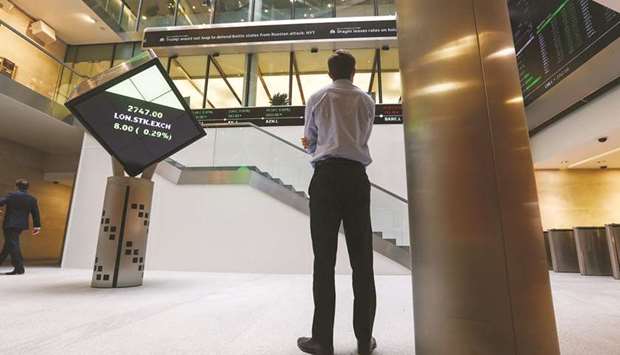European stocks slipped yesterday as losses in defensive sectors offset gains in oil and retail stocks, while investors looked past a new national lockdown in Britain aimed at curbing a coronavirus surge.
UK’s FTSE 100 rose 0.6% at 6,612.25 points, boosted by oil majors Royal Dutch Shell and BP, as crude prices inched higher with deadlocked talks between major producers about potential changes in February output set to continue.
The domestically focussed midcap index gained 0.9% as UK’s finance minister Rishi Sunak announced plans to support businesses struggling under a third Covid-19 lockdown.
“The stock market reaction to a new lockdown in England could have been a lot worse, but it is fair to say there were plenty of signs in recent days that full lockdown was coming, such as similar restrictions being announced in Scotland yesterday,” said Russ Mould, investment director at AJ Bell.
“Nonetheless, given the severity of the lockdown restrictions one might have expected a repeat of last year’s trends with lockdown losers slumping on the stock market and beneficiaries rallying. That’s not entirely the case this time round.”
European stocks rallied to fresh February highs on the first trading session in 2021 on Monday on hopes the vaccines will spur a speedy economic rebound.
The global mood dampened yesterday ahead of the Senate election outcome, which could have a big impact on incoming US President Joe Biden’s ability to pursue his preferred economic policies.
Stocks considered as safe-havens like utilities, healthcare and food & beverage were among the biggest sectoral decliners in Europe.
Germany’s DAX index dropped 0.6% at 13,651.27 points with the government looking to extend a lockdown, while France’s CAC 40 slipped 0.4% to 5,564.60 points. The pan-European STOXX 600 index fell 0.2%, following losses on Wall Street over worries about Senate runoffs in the US state of Georgia.
Retailers were a bright spot, with Britain’s Next jumping 8.0% after it said its Christmas sales were much better than expected.
Shares in Marks and Spencer, Morrisons and Tesco rose between 0.2% and 1.2% after market researcher Kantar said British grocery sales hit a record high in December.
German chipmaker Dialog Semiconductor PLC gained 2.7% after it gave an upbeat fourth-quarter revenue forecast due to strong demand for 5G phones and tablets.
ASML rose 0.2% after analysts at RBC and Liberum raised their price targets on the stock.
Oil prices shot higher yesterday as Opec and its partners discussed whether or not to raise production, while stocks were mixed.
The price of the main US oil contract, WTI, jumped more than five % higher at one point to hit $50 a barrel for the first time since February.
Opec and its partners are discussing whether to add 500,000 barrels of oil onto the market next month or to hold off given the rash of tighter coronavirus lockdowns that will likely dampen demand.
“Brent crude oil and WTI are showing solid gains as there is talk that OPEC+ are edging towards a compromise whereby the current output level will be maintained,” said market analyst David Madden at CMC Markets UK.
The news of fresh lockdowns and slow vaccination campaigns kept European stocks mostly on the back foot.
The UK began implementing yesterday new national restrictions set to last weeks as the country is beset by a new variant of the coronavirus that apparently spreads faster.
For the markets, the news was counterbalanced in part by the announcement of an extra £4.6bn package for virus-battered businesses.
“The mood has soured somewhat as a result of the national lockdowns which are once again coming into force or being extended,” OANDA analyst Craig Erlam told AFP.
“This was maybe inevitable anyway as a result of the (Christmas) festivities taking place in the midst of an already severe wave of Covid-19 but the new variant has thrown another spanner in the works.”
In recent months, governments worldwide have tightened or prolonged lockdown restrictions to combat the health crisis.
While analysts are broadly upbeat about the long-term outlook this year, the nascent Covid-19 vaccine programmes have yet to have an impact, meaning the first few months of this year will likely be bumpy.
Wall Street’s main stock indices were higher in late morning trading meanwhile, with the Dow up less than 0.1%.
Investors watched anxiously as voters in Georgia cast ballots in run-off elections for two Senate seats which will decide the balance of power in the upper house of Congress.
“Today’s price action alone offers few if any hints over what any given result would mean for financial markets,” said Stephen Innes, chief global market strategist at Axi. He said it was unclear whether markets would welcome a Democratic win as a harbinger of more government spending or spurn it as it would likely mean tax increases and more regulation.

A visitor looks at a ticker of share prices at the London Stock Exchange. The FTSE 100 rose 0.6% at 6,612.25 points yesterday.
